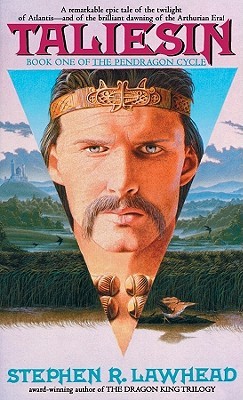Today I'm looking at the first of the five books of The Pendragon Cycle by Stephen R. Lawhead. The reason I'm looking at this series is twofold. First, it's a different take on Arthurian legend and as I may have established previously on this blog, I am a huge sucker for Arthurian legend. Secondly, I can get all of them for free from the library to listen to, so that's a pretty good deal in my opinion. This series is, as far as I can tell, an attempt to make the Arthurian mythos vaguely match up with history. I say vaguely because once you've thrown Atlantis and magic into the mix it's hardly become historical fantasy anymore.
The book mostly follows the lives of Taliesin, a prince of a Celtic tribe in Britain during the waning days of the Roman Empire, and Charis, the princess of one of the nine kingdoms of Atlantis. The book alternates between Taliesin and Charis until Charis and her people are forced to flee Atlantis and arrive in Britain where they meet Taliesin's people. Charis and Taliesin eventually fall in love and have a son whom they name Merlin. So really this book is a really long story about Merlin's parents.
I'm not sure how I feel about this book because it feels like a very lengthy exercise in setting the conflict for later books up rather than accomplishing much itself. There are a few important things that happen, it is true, and we're pretty explicitly beat over the head with the idea that dark days are coming. The fall of Atlantis is blamed on a rise in some mysterious dark force, although what it is I'm not entirely sure. Possibly Satan? And then there's the general fall of Rome from Britain and the arrival of Irish, Picts, Scots, and Saxons in Britain causing all sorts of trouble. So yeah, things are pretty bad, but I was left with the feeling the book took so long to talk about how bad things were and setting things up for later books, that this felt like an extended prologue.
I'm also not sure on the decision to talk about Merlin's parents and grandparents. There are some interesting approaches, such as having the stories of Fair Folk be about people from Atlantis who just act very differently from the native residents of Britain, or having Charis's title of Lady of the Lake be an affectionate name Taliesin gave her. And while Taliesin is a name established in Welsh folklore (at least what a minimal amount of digging managed to turn up for me anyway), I am left wondering how many casual readers of Arthurian myth would pick up on the connection. And, as I said, I was left with the feeling that not a lot happens in this book so much as it's setting stuff up for the next books. It's okay to do twists on Arthurian legend. Heck, Gwenhwyfar was one enormous twist on the mythos and I loved it. But at least in Gwenhwyfar there were characters we recognized from the story so we could compare them to how they differed. In this one, we really only get the Fisher King, the Lady of the Lake, and Merlin as a baby. I just wish there had been more familiar characters for us to see. Maybe in the next book we'll see more, like Uther Pendragon, Arthur's father. But that remains to be seen.
In an interesting side note, I've also discovered what it takes for me to suspend my disbelief. Magic? Fine. Atlantis? No problem. Potatoes, an American root crop, in Roman Britain? Hold on there, something's not right! It was really a throwaway line that the author probably didn't give a second thought, but me being the pedantic historian I am I latched onto it. I'm also not sure about claiming Mithras and Isis were the same god but in male and female forms. Although we have very little information about Mithras to begin with so it's hard to say for certain. I did feel like the theology of this book's universe got really fuzzy. Like I didn't understand why British druids would care about the birth of Jesus who they admit as the son of the good god but don't worship as a god? Until Taliesin meets god and becomes a prophet of Christianity? Seriously, Christianity comes in really suddenly and Taliesin's basically, ''Aw man, Christianity is the best thing ever! Their god is awesome!'' Which...okay, cool, I guess. It just feels odd to me because I know some of the Christianity stuff like the Grail Quest got grafted onto the Arthurian mythos much later.
So far I feel like of the more ''historical'' takes on Arthurian legend, Gwenhwyfar leaves this one far behind in the dust. Maybe it will improve with later books, but that remains to be seen.
- Kalpar


No comments:
Post a Comment